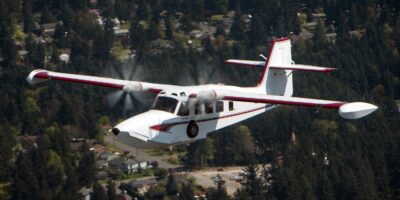Ihave written and deleted the first paragraph of this column several times. The original version was about the CAA’s General Aviation Partnership (GAP) and its latest minutes. They’re close to being as boring as they sound, but I changed the subject, not as a result of more tedium than usual, but because there’s something much more important that worries me – and should probably worry you too.
Bloomberg recently reported on some research that’s been done by the University of Kent on lead pollution in the UK, and the contribution made by ‘small piston-powered planes’.
The university research suggests that 100LL fuelled GA aircraft are the biggest contributor to the problem, allowing Bloomberg a clickbait headline suggesting that the problem could be ‘14,000 times worse’ than the UK Government suggests.
If that’s not scary enough, the research further suggests that 370,721 houses in the UK are close enough (within 4km) of a General Aviation airport to be at risk of exposure to lead emissions.
They’re not comfortable numbers, and if you listen carefully you can hear the nimbys reaching for their keyboards, while the property developers with airfields in their land banks rub their hands with glee. But before we get too carried away, it’s worth taking a closer look at how the conclusions were reached.
Firstly, Bloomberg clearly states that the report is a first order estimate reached after analysing UK numbers and applying the ‘at risk’ metric from two US studies.
Those US studies looked at 448 airports which, on average, had 406 movements per month. I’m kinda struggling with that monthly average. I don’t have access to the US methodology, but there can’t be that many GA airports with so few movements, and if you’ve flown GA in the US you’ll know that you don’t usually book in, book out or pay a landing fee.
The vast majority of GA airports operate on Unicom with nobody in the tower writing strips or creating movement logs, not to mention the fact that many are available for anyone to use 24 hours a day, while as we all know, most UK airports roll up their runway and make it unavailable when the sun goes down.
To come up with its conclusion, the UK report states that, unlike the US research, it did not take into account prevailing wind, or, perhaps more importantly, movement numbers.
It concludes (wrongly in my opinion) that many airports in the UK will have higher movement numbers than those in the US.
There are other estimates and assumptions used in the research, with the lack of accurate and available data leading the authors to conclude that this lack of data highlights a ‘lack of oversight of GA facilities and their impact on the health of local populations’.
The UK researchers found that 59% of GA aircraft could use either unleaded avgas or suitable mogas (all of which is unleaded), while 41% were restricted to 100LL, although the recently approved (in the US) but not yet available G100UL would effectively bring unleaded avgas to the entire fleet.
There are elements around the extrapolation off the US data that I question, and that make me think the ‘underestimated by 14,000 times’ headline is way off the mark, but none of that should be used as a reason to ignore the work that has taken place, the potential risks, or to move as quickly as we can to lead-free fuelling solutions.
As the authors identified, it is likely that some kind of duty incentive or regulation would be needed to drive the change, but if UL91 and G100UL can be provided at or around the cost of 100LL, there’s no good reason not to change, particularly given that the entire world production of 100LL relies on tetraethyl lead, all of which is made by just one single UK company.







